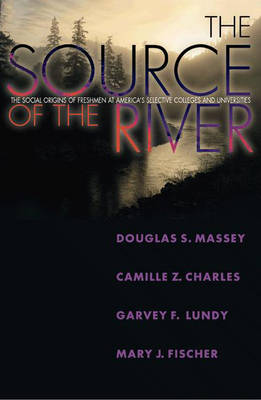The William G. Bowen Memorial Series in Higher Education
2 total works
Taming the River
by Camille Z Charles, Mary J Fischer, Margarita A Mooney, and Douglas S. Massey
Published 1 January 2009
Building on their important findings in The Source of the River, the authors now probe even more deeply into minority underachievement at the college level. Taming the River examines the academic and social dynamics of different ethnic groups during the first two years of college. Focusing on racial differences in academic performance, the book identifies the causes of students' divergent grades and levels of personal satisfaction with their institutions. Using survey data collected from twenty-eight selective colleges and universities, Taming the River considers all facets of student life, including who students date, what fields they major in, which sports they play, and how they perceive their own social and economic backgrounds. The book explores how black and Latino students experience pressures stemming from campus racial climate and "stereotype threat"--when students underperform because of anxieties tied to existing negative stereotypes. Describing the relationship between grade performance and stereotype threat, the book shows how this link is reinforced by institutional practices of affirmative action.
The authors also indicate that when certain variables are controlled, minority students earn the same grades, express the same college satisfaction, and remain in school at the same rates as white students. A powerful look at how educational policies unfold in America's universities, Taming the River sheds light on the social and racial factors influencing student success.
The authors also indicate that when certain variables are controlled, minority students earn the same grades, express the same college satisfaction, and remain in school at the same rates as white students. A powerful look at how educational policies unfold in America's universities, Taming the River sheds light on the social and racial factors influencing student success.
The Source of the River
by Douglas S. Massey, Camille Z Charles, Garvey Lundy, and Mary J Fischer
Published 15 December 2002
African Americans and Latinos earn lower grades and drop out of college more often than whites or Asians. Yet thirty years after deliberate minority recruitment efforts began, we still don't know why. In "The Shape of the River", William Bowen and Derek Bok documented the benefits of affirmative action for minority students, their communities, and the nation at large. But they also found that too many failed to achieve academic success. In "The Source of the River", Douglas Massey and his colleagues investigate the roots of minority underperformance in selective colleges and universities. They explain how such factors as neighborhood, family, peer group, and early schooling influence the academic performance of students from differing racial and ethnic origins and differing social classes. Drawing on a major new source of data - the National Longitudinal Survey of Freshmen - the authors undertake a comprehensive analysis of the diverse pathways by which whites, African Americans, Latinos, and Asians enter American higher education.
Theirs is the first study to document the different characteristics that students bring to campus and to trace out the influence of these differences on later academic performance. They show that black and Latino students do not enter college disadvantaged by a lack of self-esteem. In fact, overconfidence is more common than low self-confidence among some minority students. Despite this, minority students are adversely affected by racist stereotypes of intellectual inferiority. Although academic preparation is the strongest predictor of college performance, shortfalls in academic preparation are themselves largely a matter of socioeconomic disadvantage and racial segregation. Presenting important new findings, "The Source of the River" documents the ongoing power of race to shape the life chances of America's young people, even among the most talented and able.
Theirs is the first study to document the different characteristics that students bring to campus and to trace out the influence of these differences on later academic performance. They show that black and Latino students do not enter college disadvantaged by a lack of self-esteem. In fact, overconfidence is more common than low self-confidence among some minority students. Despite this, minority students are adversely affected by racist stereotypes of intellectual inferiority. Although academic preparation is the strongest predictor of college performance, shortfalls in academic preparation are themselves largely a matter of socioeconomic disadvantage and racial segregation. Presenting important new findings, "The Source of the River" documents the ongoing power of race to shape the life chances of America's young people, even among the most talented and able.

